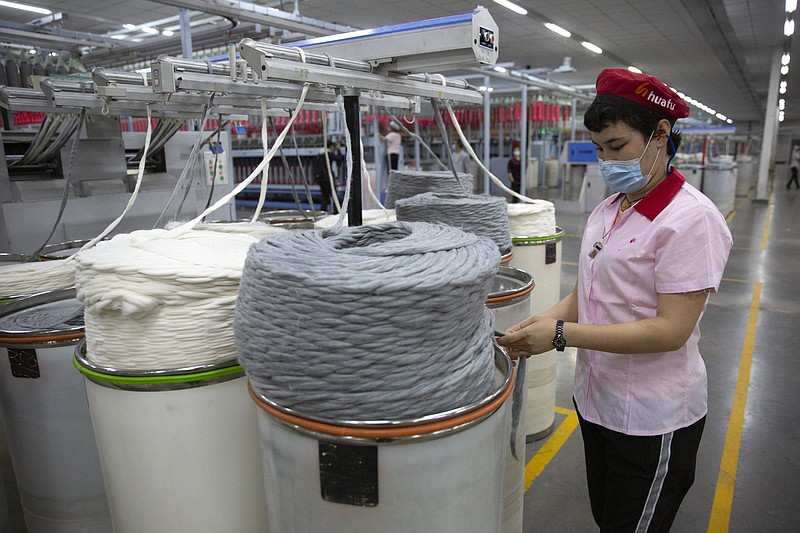AKSU, China -- A backlash against reports of forced labor and other abuses of the largely Muslim Uyghur ethnic group in Xinjiang is taking a toll on China's cotton industry, but it's unclear if the pressure will compel the government or companies to change their ways.
Li Qiang, general manager of the Huafu Fashion yarn factory in Xinjiang, told reporters that even though the company lost money in 2020 for the first time in its 27-year history, it bounced back by shifting to domestic orders.
"This is now in the past," Li said. "We've turned things around in the first quarter of this year."
Li blamed a sharp fall in foreign orders, as customers including Adidas and H&M cut ties, on "fake news" in a 2019 Wall Street Journal story that said brand name apparel makers and food companies were entangled in China's campaign to forcibly assimilate its Muslim population. Huafu also cited U.S. sanctions and the coronavirus pandemic.
In a crackdown since 2017 after a series of militant attacks, the Chinese government has detained a million or more people in Xinjiang, a major cotton-producing region in China's northwest that is home to the Uyghurs and other ethnic groups. Critics also accuse it of torture, forced sterilization and cultural and religious suppression.
Apart from cotton, much of the world's polysilicon for photovoltaic cells comes from Xinjiang. The U.S. is now weighing sanctions over the alleged use of forced labor in the production of solar panels.
Xinjiang officials deny the charges and brush off Western criticism. They recently took about a dozen foreign journalists to the sprawling Huafu complex in Aksu city, where 780,000 spindles churn out 100,000 tons of colored yarn annually for sportswear and other items.
The company said in a preliminary estimate last month that it earned about $20 million in the first three months of this year, after a $63 million loss in 2020 as sales fell 10%.
Evidence of forced labor comes from people who have left China and government documents, but it is difficult to prove definitively at specific factories since human-rights experts and others are unable to investigate freely. Diplomats and journalists traveling independently to Xinjiang are followed, and most residents, wary of getting in trouble, are unwilling to talk critically.
"The government doesn't want information flowing out of the region and they've done a good job of making that difficult," said Scott Nova, the executive director of the Worker Rights Consortium in Washington.
An ethnic Kazakh woman from Xinjiang who fled to Kazakhstan said she was forced to work for a week sewing uniforms in a factory in 2018 after spending almost a year in detention.
Dina Nurdybai ran a clothing business with 30 employees before she was detained. She said the factory work was not voluntary. She was released after authorities realized she was not on a list of long-term detainees.
"If they say they are taking you to a factory, you say 'yes,' " she said. "If you don't go, they'll say you have problematic thoughts and persecute you."
Others also have said they or their relatives were coerced to work in factories.
The government says such testimonies are fabrications. One worker, Paziliya Tursan, said above the hum of spindles at Huafu that reports of forced labor are nonsense. As officials listened in, she said people at the factory stick together like pomegranate seeds, echoing a metaphor used by President Xi Jinping to describe ethnic unity in China.
The U.S. decided last year that the evidence was strong enough to ban imports of clothing, cotton, hair products and computer parts from about a half dozen companies. In January, it expanded the ban to all cotton and tomato products from Xinjiang, which produces processed foods such as tomato paste and about one-fifth of the world's cotton.
U.S. customs denied a request this month from Japanese retailer Uniqlo to release a shipment of men's shirts that had been stopped at a southern California port in accordance with the sanctions.
Guixiang, a Communist Party spokesperson in Xinjiang, said companies may lose customers in the short run but eventually become stronger as they and their employees work harder and find new markets. "In some sense, the stress can be transformed into a driving force for the companies," he said.
China has a huge domestic market and demand is growing in Southeast Asia, the Mideast, Africa and Eastern Europe, said Peng Bo, a senior vice president at China International Futures Co., a financial derivatives firm in Beijing. Chinese manufacturers also have gained market share as the pandemic hobbled competitors in other countries.
"Though the international market is important to domestic brands, it is not irreplaceable, particularly the European and American markets," he said.
Information for this article was contributed by Si Chen of the Associated Press.









